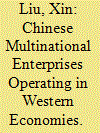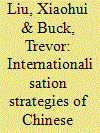| Srl | Item |
| 1 |
ID:
178738


|
|
|
|
|
| Summary/Abstract |
Huawei serves as a vehicle for presenting the multiple barriers faced by Multinational Enterprises (MNEs) that happen to be born in China, a non-democratic and non-Western country who now challenges the world’s No.1 superpower, thus requires a multi-disciplinary analytical framework by taking much broader contexts into considerations. This comparative case study of its operations in the US and UK aims to develop the old model of examining Chinese MNEs that is heavily economic factor focused by including more variables, such as ‘bilateral relations’, ‘law’, ‘media influence’ and ‘cultural proximity’ under host country factors, and ‘governance structure’ under home country factors. The new model will show the increasing complexity in the global competitive landscape and inspire more research to further advance understanding of this new international business phenomenon.
|
|
|
|
|
|
|
|
|
|
|
|
|
|
|
|
| 2 |
ID:
102718


|
|
|
|
|
| Publication |
2011.
|
| Summary/Abstract |
Are the internationalization strategies of China's private businesses different from those of state-owned businesses? To date, little systematic empirical research addresses this question, despite the now well-established arguments that market and institutional imperfections influence the outward foreign direct investment (ODI) of China's state sector MNEs. Why is so little known about private sector foreign direct investment? One important reason is that private companies have gone to considerable lengths to conceal their activities by using offshore holding companies in tax havens. This paper, using a sample of offshore listed companies that are privately controlled, investigates what we dub 'onward-journeying' - foreign direct investment undertaken via tax havens. In doing so it further explores the ODI strategies of some of China's most successful private companies.
|
|
|
|
|
|
|
|
|
|
|
|
|
|
|
|
| 3 |
ID:
088465


|
|
|
|
|
| Publication |
2009.
|
| Summary/Abstract |
Theories of overseas investment and forms of internationalisation are reconsidered in the face of two exploratory, 'critical instance' case studies collected in China from Lenovo and BOE. The two cases tentatively suggest refinements to conventional OFDI theories that see internationalisation in two important MNEs from China as being driven by factors such as ownership advantages and low labour costs at overseas locations. In terms of entry modes, it would appear that latecomer multinationals from emerging economies may aim to build global strategic linkages, seek new markets and obtain advanced technology, through foreign ventures that are accelerated quickly through entry modes towards acquisitions.
|
|
|
|
|
|
|
|
|
|
|
|
|
|
|
|
| 4 |
ID:
139544


|
|
|
|
|
| Summary/Abstract |
The growth of Chinese multinational enterprises (MNE) has stimulated great interest in their outward foreign direct investment (FDI) strategies, particularly among academics in business and management studies. To date, however, serious methodological shortcomings plague empirical studies in these disciplines. Specifically, the vital issue of how Chinese MNEs use and route FDI via tax havens and offshore financial centres is not adequately dealt with. These practices have created large geographical, industrial composition and volume biases in Chinese outward FDI data. Using a sample of 100 Chinese MNEs, we illustrate how the use of tax havens and offshore financial centres has created these biases, and examine the implications for understanding Chinese MNE activity.
|
|
|
|
|
|
|
|
|
|
|
|
|
|
|
|